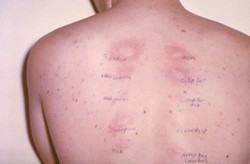The occurrence of a hypersensitivity immune response indicates that the person is allergic to a medication, food, insect venom, or some other substance which he or she cannot tolerate. When the reaction is immediate, the situation is life-threatening, and prompt medical attention is necessary to reverse it [1, 2].
Immediate reactions are those which physicians classify as anaphylaxis. Of the food items which may prompt this, peanuts are especially common. Exercise and exposure to latex can also trigger it, and workers who use latex gloves must observe whether they ever have skin irritation from them [1, 2].
Immediate hypersensitivity immune response generally occurs in people who are between the ages of 20 and 49 [1].




 The Reality of Aspirinon 05/24/2021
The Reality of Aspirinon 05/24/2021
 An Old Microbeon 03/31/2021
An Old Microbeon 03/31/2021
 Coronavirus and Mental Illnesson 02/14/2021
Coronavirus and Mental Illnesson 02/14/2021
 Acute Ischemic Strokeon 12/25/2020
Acute Ischemic Strokeon 12/25/2020


Comments